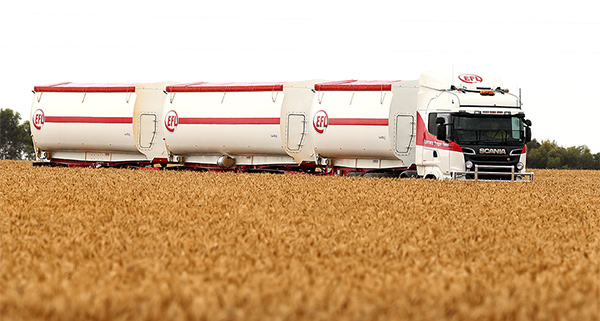The European big banger is given plenty of trailers and weight to handle in a remote part of WA
There are a few brands that come to mind when it comes to hauling road trains in some of the more far-flung corners of the Australian continent.
However, the image of a bug-splattered, multi-trailer combination rumbling down an Aussie red dirt road typically features a square snouted prime mover and a North American badge on the radiator grille.
So with the Western Australian harvest in full swing, we jumped behind the wheel of a Scania R730 recently to see how the most powerful on-highway truck on the Australian market performed with a king-sized load on its back.
Are all those horses just pampered Euro ponies?
And just how does a Euro prime mover handle dirt tracks, broken asphalt and country highways with three trailers behind it at a gross weight of over 115 tonnes?
The answer was a surprise indeed.
The R730 we drove belongs to Esperance Freight Lines which is owned and operated by Michael Harding, who, having grown up around the business, is no stranger to trucking in southern WA.
These days the EFL fleet numbers 73 prime movers and 300 trailers and half of those trucks wear the Scania chook on the front.
The 8×4 Scania rides on airbags from front to back and this would also be the time that I’d driven a heavy duty truck with load sharing air-suspended steer axles.
Behind the big Scania was a three trailer C-Train tipper combination, the WA interpretation of an AB triple with the B-double set at the front and a tri-axle dolly and dog trailer at the back.
With concessional loading for harvest this whole combination is good for an 80-tonne legal payload.
This makes a gross weight of 121 tonnes which would no doubt would be a good test of the R730’s 16-litre V8.
This year’s harvest is a bumper one for the Esperance grain growing region with 3.3 million tonnes of grain expected to be stripped.
EFL has 26 trucks dedicated to harvest work as well as using subbies over the season.
Most of this grain will be trucked back to the CBH terminal at Esperance before being shipped from the port.
We loaded on a property in the Wittenoom Hills area, 65 km north east of Esperance.
The truck and trailer combination was just two weeks old with the odometer showing just over 4,400 km on the clock.
With the load on board and the tarps rolled over I rumbled through the paddock towards the road to town.
The C-train combination is relatively compact at 36.5 metres long and tracks very nicely.
The 12-speed Opticruise AMT held the gear changes back as we rolled along the dirt tracks until we got some momentum up.
But out on the country dirt road I gave it some more gas and let the big donk knuckle down and work.
At this point I thought it might be interesting to play with the transmissions three different performance modes, Standard, Eco and Power.
The Eco mode actually worked quite well even at this weight, jumping up a cog at around 1,500rpm and dropping back to 1,050rpm.
Even then the big bent eight had enough grunt to haul the tacho needle back up for the next gear change.
Power mode held the gear changes for longer, giving about 1,900 rpm before the next change.
However, the middle of the road standard setting did the job just fine using rpm where needed but letting the momentum of the combination give it a helping hand where possible.
The stability and handling of the air-suspended twin steer axles was superb, even on dirt and rough, broken blacktop.
Where some twin steer set up can feel like you are hitting every bump twice, the Scania set up let larger bumps roll though the front end without a double impact.
Given the short drawbar between the dog trailer and the rest of the combination I was expecting that rear trailer to be a little jittery at highway speeds.
But, given the stability and ride provided by the front end the dog trailer tracked along nicely with very little sway on the rough stuff.
Getting up to speed brought out a hairy chested, if muted, exhaust note that I’d never heard from the big banger before.
It really was hauling.
However, the 3,500Nm of torque could be most felt once it was cruising on the highway at 95-100km/h.
The Scania only gives you peak torque in the top two gears of the Opticruise ‘box.
Which meant that the big V8 did a sensational job of highway hills, reducing tranny down changes.
It simply rolled along, lugging down where needed but maintaining a good average speed.
If the V8 was the star of the show, the Scania retarder wasn’t too far behind it.
A bit of forethought on approaching an intersection meant I could pull up the rig, keep my foot off the brake pedal and keep the ‘730 rolling even at such a large weight.
It really was impressive.
I’ve been guilty in the past of saying the R730 is more an exercise in vanity rather than a serious heavy hauling contender.
However, my drive in the big Swede really did open my eyes to the capabilities of the smooth performing Scania powerhouse.



